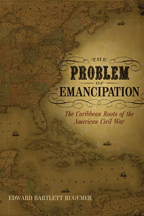
360 pages / 6.00 x 9.00 inches / 4 Maps
History / United States - Civil War Period
While many historians look to internal conflict alone to explain the onset of the American Civil War, in The Problem of Emancipation, Edward Bartlett Rugemer places the origins of the war in a transatlantic context. Addressing a huge gap in the historiography of the antebellum United States, he explores the impact of Britain's abolition of slavery in 1834 on the coming of the war and reveals the strong influence of Britain's old Atlantic empire on the United States' politics. He demonstrates how American slaveholders and abolitionists alike borrowed from the antislavery movement developing on the transatlantic stage to fashion contradictory portrayals of abolition that became central to the arguments for and against American slavery.
Richly researched and skillfully argued, The Problem of Emancipation explores a long-neglected aspect of American slavery and the history of the Atlantic World and bridges a gap in our understanding of the American Civil War.
"A most persuasive work that repositions the American debates over emancipation where they clearly belong, in a broader Anglo-Atlantic context."--Reviews in History
"Most discussions about the roots of the American Civil War seldom stray beyond the nation's borders, but Rugemer makes a persuasive case for why that should change." --Charleston (SC) Post and Courier
"A tremendous contribution to the greatest issue and ongoing controversy in pre-twentieth-century American historiography: the causes of the American Civil War. I was quite unprepared for Rugemer's crucial discoveries as he studied the way dozens of southern and northern newspapers responded to the British West Indian slave insurrections, to the British act of emancipation, and to the consequences of this so-called Mighty Experiment. Few historians have shown such sophistication in analyzing the rapidly changing pre-Civil War media and the shifts in public opinion."--David Brion Davis, author of Inhuman Bondage: The Rise and Fall of Slavery in the New World
Found an Error? Tell us about it.